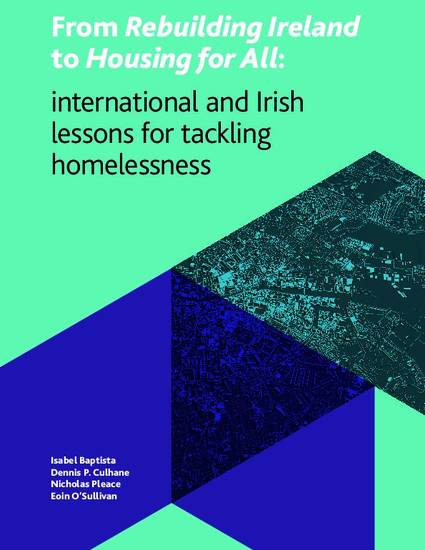
Other
From "Rebuilding Ireland" to "Housing for All": International and Irish Lessons for Tackling Homelessness
(2022)
Abstract
A group of international researchers with experience of strategic analysis of homelessness policy, practice and service programmes were asked to review the effects of the Rebuilding Ireland strategy on the level and nature of Irish homelessness. The review took the stance of a critical friend, drawing on possible lessons from practice elsewhere in Europe and in North America.
The review included discussions and consultations with stakeholders in the design and delivery of homelessness policy and services and with people with lived experience of homelessness, who were asked about the issues they thought were most important in reducing homelessness in Ireland.
Irish views on strengths and limitations were identified through these discussions, which were then used to structure the wider analysis in this review, drawing on possibly beneficial practice from other countries and avoiding some of the problems other countries had encountered. The review did not consider the specific questions arising around migrant groups who are ineligible to join housing lists.
Homelessness was seen as being defined in a relatively narrow way, i.e. focusing on people sleeping rough and the number and duration of stays in emergency accommodation. This was seen as neglecting hidden homelessness and by extension, not fully recognising and not fully responding to the true nature of homelessness in Ireland. While some measures had fallen, experience of homelessness remained more common than had been the case. Existing measures were also thought to highlight urban homelessness.
Women’s experience of homelessness tends to be significantly underestimated when enumeration does not include an attempt to count hidden homelessness. The most effective, integrated strategies, including practice in Scotland and Finland, use a wide definition of homelessness which facilitates a more comprehensive array of prevention, rapid rehousing and housing-led, Housing First and supported housing services and cross referral of a broadly defined ‘at risk’ population across wider health, criminal justice and social protection systems.
Affordable and social housing supply were thought to be at the core of homelessness causation and the limitations of existing policy in preventing and ending homelessness. Services like Housing First were hampered, as was any service within a housing-led framework as soon as adequate, affordable housing with reasonable security of tenure was in short supply. Progress was noted in addressing these issues, but more social and affordable housing was needed. People with lived experience of homelessness reported that only social housing offered the affordability, standards and security of tenure that enabled a sustained exit from homelessness.
Internationally, no level of coordination, evidence-led practice or comprehensiveness of response has been found that counteracts the effects of insufficient affordable, adequate homes with security of tenure. Prevention, housing-led and Housing First services, alongside the integration of health, mental health, addiction, criminal justice and welfare systems in a homelessness strategy will either be limited, or fail, if there are not enough suitable homes with which to prevent and end homelessness.
Progress has been made in homelessness prevention in Ireland, although with the caveat that the ongoing issues with inadequate housing supply limit overall effectiveness. There are lessons from comprehensive preventative systems used in other countries, such as that developed in Wales, which define and respond to homelessness on a broad basis and appear to reach much of the population who are at risk of homelessness.
Housing First has become a significant part of the policy response to homelessness. Systems are at their most developed in Dublin and other urban areas, with reports of more uneven coverage in some more rural areas. Internationally, the key lesson appears to be that Housing First delivered through a coherent, comprehensive and well-resourced strategy achieves both better coverage and more consistent results. Something to avoid is the rather haphazard development of many small scale projects, which while they may show success, are not part of a coherent, properly resourced national plan, leading to inconsistencies in coverage and results, as seen in England, Italy and Sweden.
The needs of women, which are distinct, in the sense that their homelessness is much more closely associated with domestic abuse (much ‘family’ homelessness is women lone parents and dependent children at risk of domestic abuse) and they are more likely to avoid (often male dominated) services and use informal arrangements with family, friends or acquaintances (hidden homelessness). With some exceptions in terms of women-only, housing-led and Housing First services, much service provision is still built on an assumption that homelessness is mainly experienced by lone men. This is not specific to Ireland, greater recognition of women’s needs and experiences and the extent of their homelessness is a pan-EU issue.
North West European and North American countries tend to recognise young people, including care leavers (young adults who have been in care of social work/child protection services) as having specific needs when they experience homelessness, centring on their youth, adverse childhood experiences and associated vulnerability. This is an area that could be the subject of more detailed policy consideration in Ireland.
Coordination of services and information about those services were reported as inconsistent and as in need of improvement by people with lived experience of homelessness. The standardisation of responses seen in strategies like that of Finland or the (distinct) legislative frameworks of Scotland and Wales may be useful in addressing this issue.
The review has drawn together key lessons from international experience that may be of use as the new strategy Housing for All is implemented, these include:
Recognising that a broader definition of homelessness can be the gateway to building a more comprehensive, effective strategic response.
Prevention, housing-led and Housing First services are most effective when part of an integrated, interagency homelessness strategy because they depend on cross referral to an array of other services.
Implementation must be comprehensive if a strategy is to work and this means that governance must be clear, focused and stable, ensuring that coherent strategy steadily builds in effectiveness over time.
Keywords
- homelessness,
- Ireland
Disciplines
Publication Date
September, 2022
Citation Information
Baptista, I., Culhane, D.P., Pleace, N. and O’Sullivan, E. (2022) From Rebuilding Ireland to Housing for All:
international and Irish lessons for tackling homelessness. Dublin: COPE Galway, Focus Ireland, JCFJ,
Mercy Law, Simon Communities of Ireland, and SVP.
